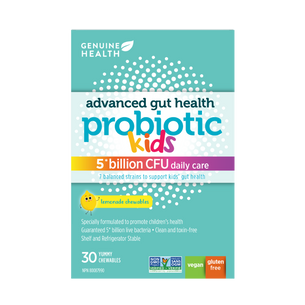The Connection Between Allergies & Probiotics in Children

As a parent, you want the absolute best for your child. Whether that’s education, experiences or opportunities, but especially their health. One of the best ways to do this is by paying extra attention to your child’s gut health from an early age.
There is a bacterial community that lives in the gut—the microbiome—that plays a major role in the development of the immune system and provides an important line of defense against bacteria and toxins that enter the body. In fact, over 70% of the immune system lives in the gut.
Research indicates that children with allergies have a few things in common with regards to their gut health. First, they have lower levels of beneficial bacteria, second, they have higher levels by comparison of some of the more pathogenic strains, and finally they have a low diversity of strains, all factors in a healthy microbiome. Other studies have found that children who later develop allergies show differences in the composition and diversity of their gut microbiota during the first months of life compared with those who do not.
ALLERGIES & THE HYGIENE HYPOTHESIS
Does it feel a bit like these days, everyone and their dog has an allergy? There are multiple theories as to why there has been a rise in allergy rates among kids, one of these theories is the hygiene hypothesis. The hygiene hypothesis essentially argues we are too clean for our own good. The prevalence of sanitization products has reduced the risk of communicable diseases, but they may also contribute to a greater die off of beneficial bacteria both on and in our bodies. More sanitation also means that human immune systems are no longer challenged as much, which is important for strengthening the immune system’s defenses.
Along the same line is the prevalence of antibiotics both in humans and in the food supply, which don’t discriminate between the good and bad bacteria in your gut. Multiple studies, including a large-scale cohort study on babies born in Sweden (note that not all mothers were Swedish), have shown a strong association between births by C-section and the risk of allergic disorders and asthma in children. During the trip through the birth canal, the baby gets many beneficial bacteria from the mother, so babies who are brought into the world through C-section may miss the healthy boost of bacteria gained in the birth canal (note that many hospitals now take steps to mitigate this). The one thing that all of these theories have in common is that there is a relationship between the diversity and numbers of bacteria in the gut and allergies.
The other thing we know is that the diets of most Canadian children now are also not conducive to a healthy and diverse microbiome. Canadian children and teens are not eating enough fruits and veggies (especially veggies) and around 40% of fruits and vegetables consumed comes from two primary sources: juice and white potato. Kids are not meeting daily recommendations for fibre, which is needed to nourish a healthy microbiome and support healthy bowel function. Kids (and even adults) also don’t typically go for other healthy sources of probiotics like fermented foods. The most commonly consumed probiotic food in a child’s diet is yogurt. For children who do not have an intolerance to dairy, yogurt is a great option, but the reality is that most children’s yogurts are full of added sugar, which is counterintuitive to a healthy gut. Furthermore, yogurt only contains about 1 billion CFU, with few strains, and no guarantee that the probiotic strains survive stomach acid intact in order to make it to the intestinal tract where they are needed.
THE BENEFICIAL ROLE OF PRE AND PROBIOTICS
Knowing what we know about allergies, immunity and gut health, addressing allergies in children should focus on cultivating a healthy and diverse microbiome with a nutrient-rich, colourful diet, in addition to specific nutritional support tailored to children’s digestive health.
Genuine Health’s advanced gut health probiotics kids is a chewable probiotic that includes 5 billion CFU from 7 balanced strains specifically selected to build and support a child’s microbiome. Among the 7 strains, it includes Lactobacillus Rhamnosus GG, one of the most researched probiotics for promoting childhood health and L. Reuteri, a natural resident of a healthy gut in childhood. Early colonization, especially with certain lactobacilli strains like L. Rhamnosus, have been shown to potentially decrease the risk for allergy development in children. The added benefit of a yummy lemonade chewable probiotic is it provides benefits for the upper GI tract as well, and is non-GMO project verified.
There is so much that is out of your control as a parent, but cultivating a healthy gut is one thing that you can control and work towards for your kids with a combination of fiber, prebiotics, fermented foods and probiotics.
Sources:
Björkstén, et al. Allergy development and the intestinal microflora during the first year of life. J Allergy Clin Immunol. 2001;108(4):516-20.
Johansson, et al. Early colonization with a group of Lactobacilli decreases the risk for allergy at five years of age despite allergic heredity. PLoS One. 2011;6(8):e23031. doi: 10.1371/journal.pone.0023031.
Mitselou, et al. Cesarean delivery, preterm birth, and risk of food allergy: Nationwide Swedish cohort study of more than 1 million children. J Allergy Clin Immunol. 2018;142(5):1510-1514.e2. doi: 10.1016/j.jaci.2018.06.044.
Thavagnanam, et al. A meta-analysis of the association between Caesarean section and childhood asthma. Clin Exp Allergy. 2008;38(4):629-33. Doi: 10.1111/j.1365-2222.2007.02780.x.
Zimmermann, et al. Association between the intestinal microbiota and allergic sensitization, eczema, and asthma: A systematic review. J Allergy Clin Immunol. 2019;143(2):467-485. doi: 10.1016/j.jaci.2018.09.025.


















































